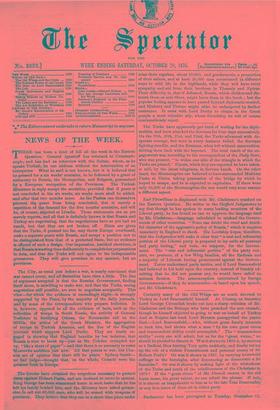The City, as usual just before a war, is nearly
convinced that war cannot occur, and all Securities have risen a little. The line of argument accepted is that the Russian Government, finding itself alone, is unwilling to make war, and that the Turks, seeing negotiation still possible, are sure to negotiate acceptably. This view—for which the evidence is exceedingly slight--is strongly supported by the Times, by the majority of the daily journals, and by some of the correspondents who prepare bulletins. It is, however, opposed to all the evidence of facts, such as the -collection of troops in South Russia, the activity of General Todleben in fortifying Odessa, the Roumanian call on the Militia, the action of the Greek Ministry, the aggregation of troops in Turkish Armenia, and the line of the English journals, which support Lord Derby. They are busily en. gaged in showing that England benefits by her isolation, that Russia is sure to break up—just as Mr. Cobden crumpled her up, "like a sheet of paper"—and that there is no necessity to resist Muscovite ambition just now. All that points to war, but Con- sols are of opinion that there will be peace. Sydney Smith— no bad judge—thought that, on the whole, Consols were the greatest fools in Europe.


































